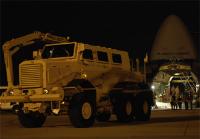The U.S. Institute of Peace report, Iraq After the Surge, that’s been bouncing around the web is notable, as Marc Lynch observes, for putting American strategic interests back where they belong, at the heart of any analysis of policy going forward. A thought that didn’t make the final cut of yesterday’s post on the competing narratives of the Surge is how both advocates and opponents shape its success or failure to defend their policy position. The U.S.I.P. report, on the other hand, identifies five core strategic goals for Iraq outcomes: -Platform for terrorism; -U.S. military capacity and credibility; -Regional stability; […]
Iraq Archive
Free Newsletter
When Gen. Petraeus testifies before Congress tomorrow, it will be the latest installment in an ongoing battle between competing narratives of the Surge. On the one hand, that of its supporters who argue that through a combination of brilliantly conceived and skillfully implemented COIN tactics, an increase in troop strength that intimidated Iraqi and Iranian agents provocateurs, and an emphasis on bottom-up reconciliation among Sunni insurgents, Iraq has been brought back from the edge of the abyss. The gains are measurable but fragile, and thus in need of continued consolidation. The major threats to stability are the result of either […]

The Defense Department late last month delivered its 4,000th Mine-Resistant, Ambush Protected (MRAP) vehicle to the Southwest Asia war zone, a rapid pace of deliveries that reflects the importance DOD places on its top procurement priority. Months after U.S. Transportation Command began shipping massive numbers of MRAPs by ship to ports in the Middle East, sealift has yet to surpass airlift as the primary means of delivery. At the end of March, more than 1,700 MRAPs had been delivered overseas from the United States by large container ship — but nearly 2,300 had been delivered by Air Force C-5 and […]
If you’re interested in what a non-alarmist view of American withdrawal from Iraq might look like, click through and read Dr. F. Gregory Gause’s testimony (.pdf) from last Thursday’s Senate Foreign Relations Committee hearing titled, “Iraq 2012: What Can It Look Like, How Do We Get There?” Gause, an Associate Professor of Political Science at the University of Vermont, offered his analysis as part of the committee’s lineup of hearings meant to put next week’s Petraeus/Crocker appearances into a broader strategic context. While he acknowledged that withdrawal would result in Iraqi violence, both sectarian and factional, he argued that even […]
To follow up on yesterday’s post about fighting Shinseki’s war with Rumsfeld’s Army, here’s Army vice chief of staff General Richard Cody on the Surge’s impact on the Army’s state of readiness (via Jason Sigger at Armchair Generalist): When the five-brigade surge went in . . . that took all the stroke out of the shock absorbers for the United States Army. In his Congressional testimony (.pdf), Cody also underlined something that I’ve flagged before but that I don’t think has gotten enough mention in the mainstream press: While our Reserve Component (RC) are performing magnificently, many RC units have […]
Thanks to Marc Lynch at Abu Aardvark for flagging the Senate Foreign Relations Committee web page, which has surrounded next week’s Ryan Crocker/David Petraeus testimony with hearings on the military situation in Iraq, the political situation, some longterm goals (2012) and how we might reach them, as well as the question of negotiating a longterm relationship with Iraq once we draw down our forces. Marc has got some excerpts from Gen. William Odom, Nir Rosen, and Gen. Barry McCaffery, all of whom paint a pretty gloomy strategic context for Petraeus’ report, but there are also some more optimistic views (Stephen […]

Something radical has begun in Iraq, but it has flown under the radar of the media and the public. For the first time since 1970, the U.S. Army is court-martialing a civilian; and not an American civilian, but a Canadian civilian. Charged with aggravated assault for attacking another contractor during an altercation, this civilian contractor now faces trial by a military court, with a jury, judge and defense counsel all in uniform, without the benefit of indictment by grand jury, and with a potential federal criminal conviction awaiting him at the end of the process. To understand why this is […]
“Beware the twelve-division strategy for a ten-division Army.” The man who spoke those words is probably the only person in America who actually suffered for being right on the Iraq War from the very start: Gen. Eric Shinseki. It’s worth remembering Shinseki’s maxim, especially in any attempt to re-vision American foreign policy in the post-Iraq War era. Because eventually we’ll leave Iraq, but unless we address the temptations that led us to invade that country in the first place, we’re likely to give in to them again. According to Dissent magazine’s tribute to Gen. Shinseki, the dispute between him and […]
The result in Basra clearly did not reflect well on the Iraqi Security Forces. But American officials and other prominent advocates of the idea that victory is within reach — or at least possible — in Iraq are saying in the wake of the Basra fighting that the Iraqi Security Forces’ poor performance was more a consequence of the poor planning of ISF commanders and Iraqi government officials — all the way up to Prime Minister Nouri al-Maliki — than of ground-level combat unreadiness. In an essay title “Maliki’s Missteps” on the Web site of the neoconservative journal Commentary today, […]
Here’s another take on last week’s Basra fighting, this time from Asia Times Online’s M K Bhadrakumar, who intelligently identifies the overlapping templates of what was at stake in the fighting: Iraq’s future as a unitary state; the parameters of acceptable federalism, if any; attitude towards the US; control of oil wealth; overvaulting political ambitions. . . In other words, not just a sectarian battle, but a complex matrix of conflict. That notwithstanding, Bhadramakur ultimately paints Maliki’s offensive as a U.S.-backed power move to secure Basra’s oil wealth. Take away the edge of glee Bhadrakumar betrays at the setback it […]
The dust is starting to settle in Basra, and the consensus that’s emerging is that we know who won, and we know who lost, but we don’t know what happened. Now if that’s not a metaphor for the Iraq War in general, I don’t know what is. First up among the unanswered questions seems to be, What the heck was Maliki thinking in pulling the trigger on this one? Retired Major William “Mac” McCallister writing over at Danger Room suggests that the battle was a form of “negotiation” between Maliki and al-Sadr: The short-term objective is to assist Sadr in […]

The unnerving footage of the black-turbaned, hirsute, pudgy-faced, snarling, 30-something Moqtada al-Sadr has reappeared on television screens across the world. Wrapped in his black cloak and eyes pointed down at a script, he rattles off his statement to a bouquet of microphones, flanked by a posse of grinning henchmen, occasionally raising a finger for emphasis. His gravitas is his very presence: an outlaw who dares show his face. With his new nine-point plan, he is Iraq’s most important politician currently outside the government, exercising a seeming ability to turn a full-scale insurgency on or off at will. Gen. David Petraeus […]
